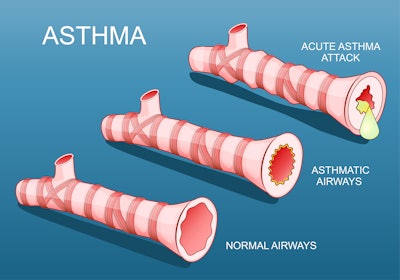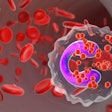
There’s new research on the molecular mechanisms that drive residual asthma exacerbations in children treated with mepolizumab, a biologic therapy targeting type 2 (T2) inflammation. Despite the drug’s effectiveness in reducing eosinophilic inflammation, a new study reveals that exacerbations persist due to alternative inflammatory pathways.
The research, “Inflammatory Pathways in Residual Asthma Exacerbations Among Mepolizumab-Treated Urban Children: A Secondary Analysis of a Randomized Clinical Trial,” was recently published in JAMA Pediatrics. Researchers analyzed nasal RNA samples from 108 children during 176 acute respiratory illness events. They found that although mepolizumab significantly blunted T2 inflammation, it led to increased expression of non-T2 pathways involving epithelial cells, macrophage activation and mucus hypersecretion. The study was conducted as part of the MUPPITS-2 phase 2 trial, which tracked participants from nine, low-income urban centers in the United States.
The study’s authors said the findings suggest that suppressing eosinophilic inflammation may inadvertently activate other inflammatory responses, particularly those linked to the airway epithelium and macrophages. These pathways appear to play a central role in residual exacerbations.
Key findings from their research include:
- Reduced T2 inflammation in mepolizumab-treated children during exacerbations.
- Upregulated epithelial and macrophage pathways, especially during viral respiratory illnesses.
- Elevated mucus secretion and cellular stress responses in both treatment and placebo groups.
- Identification of three distinct inflammatory axes contributing to exacerbation heterogeneity.
The study emphasizes the need for a broader therapeutic approach that addresses these alternative pathways. Researchers noted that as biologic therapies become more prevalent in pediatric asthma care, understanding the full spectrum of inflammatory responses is critical to improving outcomes.
Researchers also called for further investigation into targeted treatments that can modulate epithelial- and macrophage-driven inflammation, potentially paving the way for more comprehensive asthma management strategies.






















